Paycom Bundle
How Did Paycom Revolutionize HR?
Ever wondered how a company transforms the way businesses manage their most valuable resource: their people? Paycom, a leading cloud-based human capital management (HCM) software provider, has done just that. From its inception, Paycom has been on a mission to streamline and enhance HR processes. This brief history of Paycom explores the key milestones that have shaped its journey.
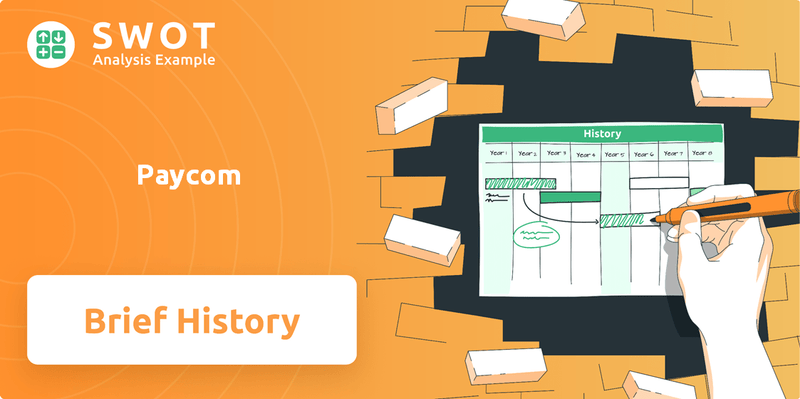
Founded in 1998, the Paycom SWOT Analysis shows how the Paycom company evolved from a regional payroll service to a national HCM leader. Understanding the Paycom history is crucial for investors and business strategists alike. This Paycom company overview will delve into the strategic decisions, technological advancements, and market dynamics that have propelled Paycom's growth over time, making it a significant player in the HR industry.
What is the Paycom Founding Story?
The story of Paycom, a leading provider of human capital management (HCM) solutions, began on December 18, 1998, in Oklahoma City, Oklahoma. The Paycom company was founded by Chad Richison, who saw an opportunity to revolutionize the payroll and HR industry. Richison's vision was to create a more efficient, user-friendly, and technologically advanced platform to address the inefficiencies prevalent in the market at the time.
Paycom history is rooted in Richison's background in payroll sales and management, which gave him a deep understanding of the challenges businesses faced. The initial focus was on providing payroll services, but the company quickly integrated technology to improve accuracy and streamline processes. This early emphasis on technological innovation set the stage for Paycom's future growth and expansion into a comprehensive HCM provider.
Paycom was founded in 1998 by Chad Richison in Oklahoma City. The initial focus was on payroll services, with a strong emphasis on technology.
- Paycom founder Chad Richison identified a gap in the market for a streamlined payroll solution.
- The company initially relied on a bootstrapped model, reflecting Richison's commitment and vision.
- Paycom's early success was built on a robust, in-house technology infrastructure.
- The company's core business model was to simplify complex HR tasks for employers.
The original business model of Paycom centered on payroll services, but with a strong emphasis on using technology to improve accuracy and efficiency. Paycom's first product was its payroll software, designed to be more user-friendly and integrated than existing solutions. The company was initially bootstrapped by Richison, reflecting a strong belief in the viability of his vision and a desire to maintain control over the company's direction. An interesting anecdote from its early days is the focus on building a robust, in-house technology infrastructure from the ground up, rather than relying on third-party vendors, which provided a strong foundation for future scalability and integration. This foundational expertise in technology and payroll set the stage for Paycom's future expansion into a full-suite HCM provider.
Paycom's early years and development were marked by a commitment to building a strong technological foundation. This involved developing its own technology infrastructure rather than relying on third-party vendors. This approach allowed Paycom to maintain greater control over its platform and ensure scalability. This strategic decision was crucial in the company's ability to expand its services and adapt to the evolving needs of its clients. The company's focus on technological advancements and in-house development played a key role in its early growth and its ability to compete in the market. For more insights, you can explore the Marketing Strategy of Paycom.
Paycom SWOT Analysis
- Complete SWOT Breakdown
- Fully Customizable
- Editable in Excel & Word
- Professional Formatting
- Investor-Ready Format
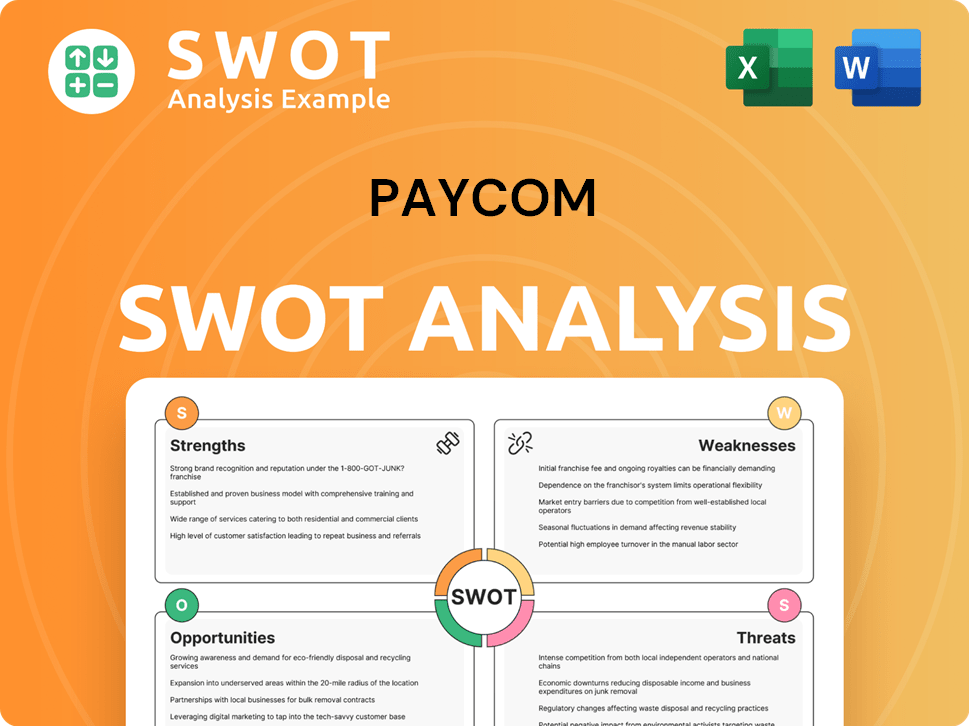
What Drove the Early Growth of Paycom?
The early growth of Paycom, a leading HR technology provider, was marked by expanding its product offerings and customer base beyond its initial payroll services. This Paycom company began to incorporate additional HR functions, such as time and attendance and HR management, developing its integrated platform. This strategic expansion was guided by client feedback and the needs of small to mid-sized businesses seeking more comprehensive HR solutions. A look at the Owners & Shareholders of Paycom can provide further insight into the company's growth.
Early sales success for Paycom was achieved through a direct sales model, emphasizing the efficiency gains and cost savings of its integrated system compared to older systems. The company increased its team and opened new offices across the United States, broadening its geographical reach beyond Oklahoma. This strategy helped establish the Paycom company as a key player.
A significant development in Paycom's growth was the shift to a Software-as-a-Service (SaaS) model, which allowed for greater scalability and recurring revenue. This period also saw Paycom secure its first major capital raises, which fueled further investment in product development and market penetration. This move was crucial for the Paycom history.
As of 2024, Paycom serves over 37,000 clients, demonstrating substantial growth from its early days. The company's revenue for 2024 is projected to be between $1.860 billion and $1.880 billion, indicating continued strong financial performance. This growth reflects Paycom's success in the HR industry.
Key milestones included the expansion of its product suite and the establishment of a robust sales model. These early achievements set the stage for Paycom's continued growth and its impact on the HR industry. The company's focus on innovation has been central to its success.
Paycom PESTLE Analysis
- Covers All 6 PESTLE Categories
- No Research Needed – Save Hours of Work
- Built by Experts, Trusted by Consultants
- Instant Download, Ready to Use
- 100% Editable, Fully Customizable
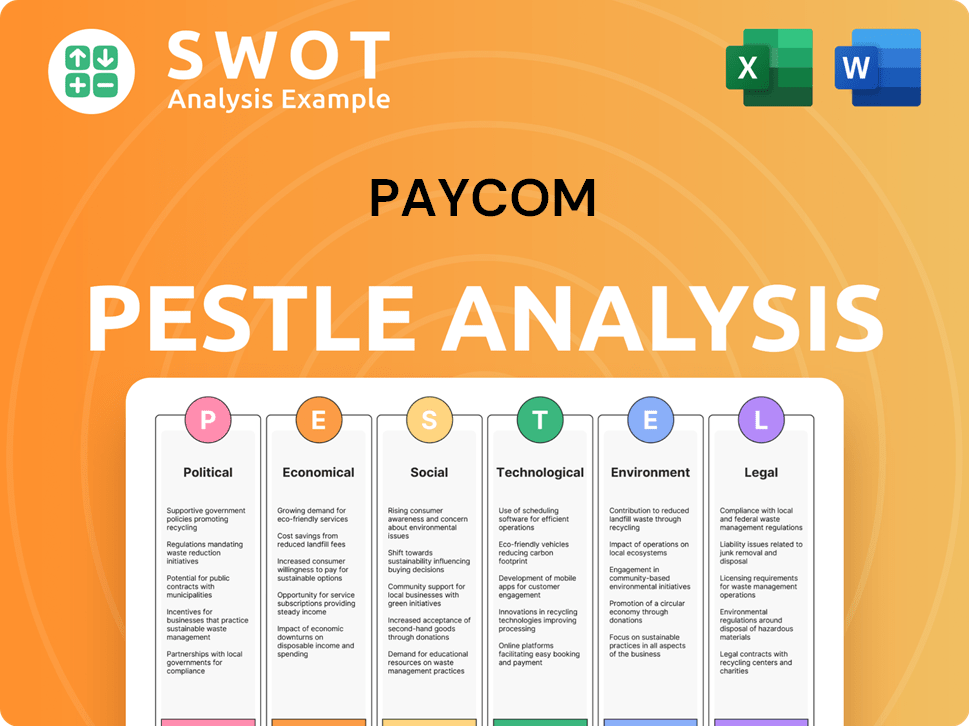
What are the key Milestones in Paycom history?
The Paycom company has a rich Paycom history, marked by significant achievements and strategic pivots that have shaped its trajectory in the Human Capital Management (HCM) industry. From its inception, Paycom has consistently evolved, adapting to market demands and technological advancements. This journey includes pioneering solutions, strategic expansions, and a steadfast commitment to innovation, all contributing to its current standing as a leading provider of HCM solutions. Understanding these milestones provides insight into Paycom's growth and its impact on the HR landscape.
| Year | Milestone |
|---|---|
| 1998 | Paycom founder Chad Richison establishes the company, initially focusing on payroll services. |
| Early 2000s | Paycom begins developing its single-database, cloud-based platform, a key differentiator. |
| 2014 | Paycom's initial public offering on the New York Stock Exchange, marking a significant step in its growth. |
| 2023 | Paycom reported a revenue of approximately $1.6 billion, reflecting continued growth and market share expansion. |
Paycom has consistently introduced groundbreaking innovations to streamline HR processes. The company's focus on a unified, cloud-based platform has set it apart, offering a seamless experience for both employers and employees. These technological advancements have not only improved efficiency but have also enhanced data accuracy and user experience.
Paycom pioneered a single-database, cloud-based platform, integrating all HCM functions. This unified approach eliminated the need for disparate systems and improved data management.
Paycom introduced Beti®, an employee-driven payroll experience, empowering employees to manage their payroll data. This innovation reduced errors and increased payroll efficiency.
Paycom services include robust employee self-service features, allowing employees to access and manage their HR information. This improves employee engagement and reduces administrative burdens.
The platform provides advanced data analytics tools, offering insights into workforce trends and performance. This data helps businesses make informed decisions and optimize their HR strategies.
Paycom offers a mobile-friendly platform, allowing users to access HR functions anytime, anywhere. This enhances convenience and accessibility for both employees and HR professionals.
Paycom integrates compliance tools to help businesses navigate complex HR regulations. This feature helps businesses stay compliant with evolving legal requirements.
Despite its successes, Paycom has faced various challenges. The HCM software market is highly competitive, requiring continuous innovation and adaptation. Economic fluctuations and changes in client spending habits have also presented obstacles, necessitating strategic adjustments to maintain growth and market position. For a deeper dive into the competitive landscape, consider exploring the Competitors Landscape of Paycom.
The HCM software market is crowded, with numerous competitors vying for market share. Paycom must continually innovate to differentiate itself and retain its competitive edge.
Economic downturns can impact client spending habits, affecting Paycom's revenue streams. The company must adapt its strategies to navigate these economic challenges.
Evolving regulatory landscapes require Paycom to continuously update its platform to maintain compliance. This necessitates ongoing investment in research and development.
Retaining clients in a competitive market is crucial for sustained growth. Paycom focuses on providing excellent customer service and continuously improving its platform to maintain client satisfaction.
Keeping pace with technological advancements requires significant investment in R&D. Paycom must stay ahead of the curve to maintain its innovative edge.
Expanding into new markets requires strategic planning and execution. Paycom must assess market opportunities and tailor its offerings to meet local needs.
Paycom Business Model Canvas
- Complete 9-Block Business Model Canvas
- Effortlessly Communicate Your Business Strategy
- Investor-Ready BMC Format
- 100% Editable and Customizable
- Clear and Structured Layout
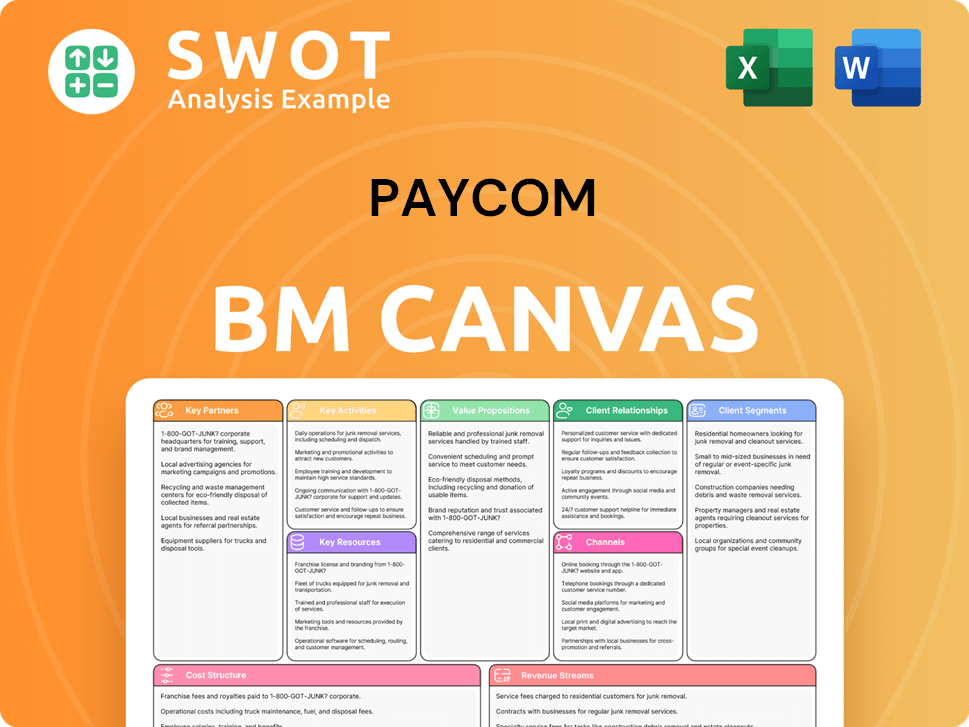
What is the Timeline of Key Events for Paycom?
The Paycom company journey is marked by significant milestones, showcasing its evolution from a payroll service provider to a comprehensive human capital management (HCM) solutions leader. Founded in 1998 by Chad Richison, the company launched its first online payroll product in 2001. Paycom broadened its offerings over the years, introducing comprehensive HR management features in 2007 and time and attendance solutions in 2010. A pivotal moment arrived in 2014 with its initial public offering (IPO) on the New York Stock Exchange (NYSE: PAYC). Further innovation came with the introduction of an employee self-service platform in 2017 and Beti, an employee-driven payroll experience, in 2020. By 2022, Paycom achieved record revenue, exceeding $1.38 billion, and in 2023, it served over 37,000 clients. The company's trajectory reflects continuous growth and adaptation within the HR technology landscape, solidifying its position as a key player in the industry.
| Year | Key Event |
|---|---|
| 1998 | Founded by Chad Richison in Oklahoma City, focusing on payroll services. |
| 2001 | Launched its first online payroll product. |
| 2014 | Completed its initial public offering (IPO) on the New York Stock Exchange (NYSE: PAYC). |
| 2022 | Achieved record revenue, surpassing $1.38 billion. |
| 2023 | Reached over 37,000 clients. |
Paycom is focused on continuous innovation within its single-database HCM platform. The company is heavily investing in artificial intelligence (AI) and machine learning to enhance HR solutions. This includes predictive analytics for workforce management and AI-driven insights for talent development, aiming to provide more personalized and efficient HR services.
Paycom aims to deepen its penetration in the mid-market segment while continuing to serve small businesses. The company's strategic initiatives include expanding its market reach and client base. Analyst predictions suggest sustained growth in the cloud HCM market, driven by the increasing demand for integrated and intuitive HR technology.
In 2024, Paycom projects annual revenue between $1.860 billion and $1.880 billion. The company's financial performance reflects its strong position in the HCM market. These projections indicate continued growth and financial success for Paycom in the coming years.
Paycom's leadership emphasizes empowering employees through technology, aligning with its founding vision. This commitment to simplifying HR and payroll processes for businesses underscores Paycom's core values. The company’s culture supports its mission to deliver user-friendly and efficient HR solutions.
Paycom Porter's Five Forces Analysis
- Covers All 5 Competitive Forces in Detail
- Structured for Consultants, Students, and Founders
- 100% Editable in Microsoft Word & Excel
- Instant Digital Download – Use Immediately
- Compatible with Mac & PC – Fully Unlocked
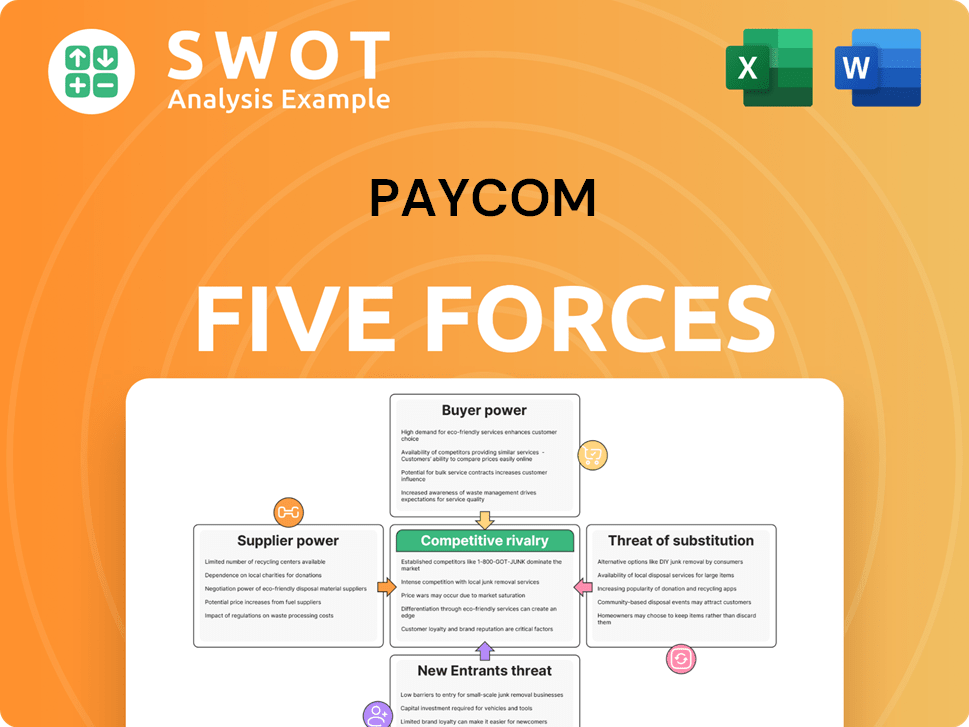
Related Blogs
- What is Competitive Landscape of Paycom Company?
- What is Growth Strategy and Future Prospects of Paycom Company?
- How Does Paycom Company Work?
- What is Sales and Marketing Strategy of Paycom Company?
- What is Brief History of Paycom Company?
- Who Owns Paycom Company?
- What is Customer Demographics and Target Market of Paycom Company?
Disclaimer
All information, articles, and product details provided on this website are for general informational and educational purposes only. We do not claim any ownership over, nor do we intend to infringe upon, any trademarks, copyrights, logos, brand names, or other intellectual property mentioned or depicted on this site. Such intellectual property remains the property of its respective owners, and any references here are made solely for identification or informational purposes, without implying any affiliation, endorsement, or partnership.
We make no representations or warranties, express or implied, regarding the accuracy, completeness, or suitability of any content or products presented. Nothing on this website should be construed as legal, tax, investment, financial, medical, or other professional advice. In addition, no part of this site—including articles or product references—constitutes a solicitation, recommendation, endorsement, advertisement, or offer to buy or sell any securities, franchises, or other financial instruments, particularly in jurisdictions where such activity would be unlawful.
All content is of a general nature and may not address the specific circumstances of any individual or entity. It is not a substitute for professional advice or services. Any actions you take based on the information provided here are strictly at your own risk. You accept full responsibility for any decisions or outcomes arising from your use of this website and agree to release us from any liability in connection with your use of, or reliance upon, the content or products found herein.